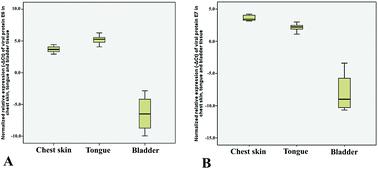当前位置:
X-MOL 学术
›
Food Funct.
›
论文详情
Our official English website, www.x-mol.net, welcomes your feedback! (Note: you will need to create a separate account there.)
Ptaquiloside from bracken (Pteridium spp.) promotes oral carcinogenesis initiated by HPV16 in transgenic mice.
Food & Function ( IF 6.1 ) Pub Date : 2020-04-30 , DOI: 10.1039/d0fo00207k Rui M Gil da Costa 1 , Tiago Neto 2 , Diogo Estêvão 3 , Magda Moutinho 4 , Ana Félix 5 , Rui Medeiros 6 , Carlos Lopes 7 , Margarida M S M Bastos 8 , Paula A Oliveira 9
Food & Function ( IF 6.1 ) Pub Date : 2020-04-30 , DOI: 10.1039/d0fo00207k Rui M Gil da Costa 1 , Tiago Neto 2 , Diogo Estêvão 3 , Magda Moutinho 4 , Ana Félix 5 , Rui Medeiros 6 , Carlos Lopes 7 , Margarida M S M Bastos 8 , Paula A Oliveira 9
Affiliation

|
Bracken (Pteridium spp.) is a common weed that is consumed as food especially in Asia, and is suspected of promoting carcinogenesis induced by papillomaviruses in the digestive and urinary systems. This is particularly worrying because the incidence of head-and-neck cancers associated with the human papillomavirus (HPV) is rapidly increasing, and HPV co-carcinogens urgently need to be identified. This study tested the hypothesis that two bracken compounds, ptaquiloside and rutin, are able to promote head-and-neck and bladder carcinogenesis in HPV16-transgenic mice. Expression of HPV16 E6 and E7 in oral and bladder tissues was confirmed using quantitative real-time PCR. Mice were exposed orally to ptaquiloside (0.5 mg per animal per week for 10 weeks from 20 weeks-old) or rutin (413 mg kg-1 day-1 for 24 weeks from 6 weeks-old), sacrificed at 30 weeks-old and studied histologically. HPV16 E6 and E7 expression was higher in oral mucosa compared with the bladder (p 0.001). Importantly, ptaquiloside, but not rutin, increased the incidence of oral squamous cell carcinomas (p = 1.2 × 10-8) in HPV16-transgenic mice. Also, cancers of unexposed transgenic mice were restricted to the tongue base, while ptaquiloside-exposed mice showed multifocal lesions throughout the oral cavity. Wild-type controls showed no oral lesions. No bladder lesions were observed in any treated or untreated group. These results indicate that ptaquiloside from bracken is able to promote oral carcinogenesis initiated by HPV16. Rutin did not show any carcinogenic effects in this model. The absence of bladder lesions may reflect an insufficient incubation period or factors related to the specific viral oncogenes present in this model.
中文翻译:

蕨菜(蕨菜属)中的普他洛糖苷在转基因小鼠中促进由HPV16引发的口腔致癌作用。
蕨菜(Pteridium spp。)是一种常见的杂草,特别是在亚洲,作为食物消费,被怀疑在消化系统和泌尿系统中促进乳头瘤病毒引起的致癌作用。这特别令人担忧,因为与人乳头瘤病毒(HPV)相关的头颈癌的发病率正在迅速增加,并且迫切需要确定HPV致癌物。这项研究检验了以下假说:两种蕨类化合物,ptaquiloside和芦丁,能够促进HPV16转基因小鼠的头颈和膀胱癌变。使用定量实时PCR证实HPV16 E6和E7在口腔和膀胱组织中的表达。将小鼠口服普他洛糖苷(每只动物每周0.5 mg,从20周龄开始持续10周)或芦丁(413 mg kg-1 day-1,从6周龄开始持续24周),在30周大时处死并进行组织学研究。与膀胱相比,口腔黏膜中HPV16 E6和E7的表达更高(p 0.001)。重要的是,在HPV16转基因小鼠中,帕他洛糖苷而不是芦丁增加了口腔鳞状细胞癌的发生率(p = 1.2×10-8)。同样,未暴露的转基因小鼠的癌症仅限于舌根,而暴露于ptaquiloside的小鼠则在整个口腔内均表现出多灶性病变。野生型对照显示无口腔损伤。在任何治疗或未治疗组中均未观察到膀胱病变。这些结果表明蕨菜中的普他洛糖苷能够促进由HPV16引发的口腔癌发生。芦丁在该模型中未显示任何致癌作用。
更新日期:2020-03-19
中文翻译:

蕨菜(蕨菜属)中的普他洛糖苷在转基因小鼠中促进由HPV16引发的口腔致癌作用。
蕨菜(Pteridium spp。)是一种常见的杂草,特别是在亚洲,作为食物消费,被怀疑在消化系统和泌尿系统中促进乳头瘤病毒引起的致癌作用。这特别令人担忧,因为与人乳头瘤病毒(HPV)相关的头颈癌的发病率正在迅速增加,并且迫切需要确定HPV致癌物。这项研究检验了以下假说:两种蕨类化合物,ptaquiloside和芦丁,能够促进HPV16转基因小鼠的头颈和膀胱癌变。使用定量实时PCR证实HPV16 E6和E7在口腔和膀胱组织中的表达。将小鼠口服普他洛糖苷(每只动物每周0.5 mg,从20周龄开始持续10周)或芦丁(413 mg kg-1 day-1,从6周龄开始持续24周),在30周大时处死并进行组织学研究。与膀胱相比,口腔黏膜中HPV16 E6和E7的表达更高(p 0.001)。重要的是,在HPV16转基因小鼠中,帕他洛糖苷而不是芦丁增加了口腔鳞状细胞癌的发生率(p = 1.2×10-8)。同样,未暴露的转基因小鼠的癌症仅限于舌根,而暴露于ptaquiloside的小鼠则在整个口腔内均表现出多灶性病变。野生型对照显示无口腔损伤。在任何治疗或未治疗组中均未观察到膀胱病变。这些结果表明蕨菜中的普他洛糖苷能够促进由HPV16引发的口腔癌发生。芦丁在该模型中未显示任何致癌作用。



























 京公网安备 11010802027423号
京公网安备 11010802027423号